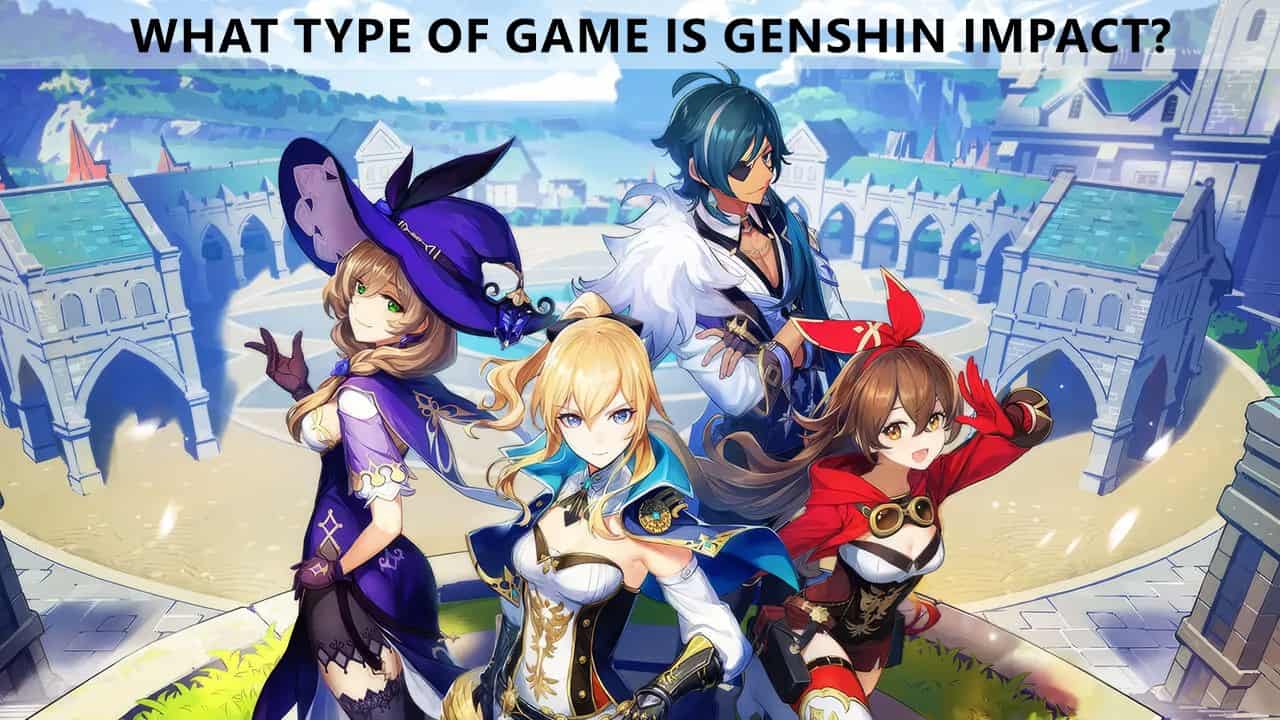Genshin Impact redefines the action RPG genre. This free-to-play game offers a vast open world, deep lore, and engaging combat. 1 It blends elements from games like Breath of the Wild with unique gacha mechanics.
Players explore Teyvat, a fantasy realm filled with diverse cultures and breathtaking landscapes. 2
As a veteran game reviewer with 10 years of experience, I’ve seen few games match Genshin Impact’s scope. The game’s music, art style, and gameplay create an immersive experience. 3 Its cross-platform support allows seamless play across devices.
Ready to discover Genshin Impact’s wonders?
Key Takeaways
Genshin Impact is a free-to-play action RPG with a vast open world called Teyvat, blending anime aesthetics, real-time combat, and gacha mechanics for character collection.
The game features elemental combat, character switching, and cross-platform play across PS5, PS4, PC, iOS, and Android, with a Nintendo Switch version in development.
Players can team up with up to three friends in co-op mode after reaching Adventure Rank 16, tackling bosses and exploring together.
Genshin Impact uses a gacha system for monetization, with less than 1% drop rates for five-star characters, and offers a Battle Pass system for additional rewards.
The game has been highly successful, grossing $3.8 billion by the end of 2022 and generating nearly $400 million within two months of its 2020 release.
Table of Contents
Overview of Genshin Impact
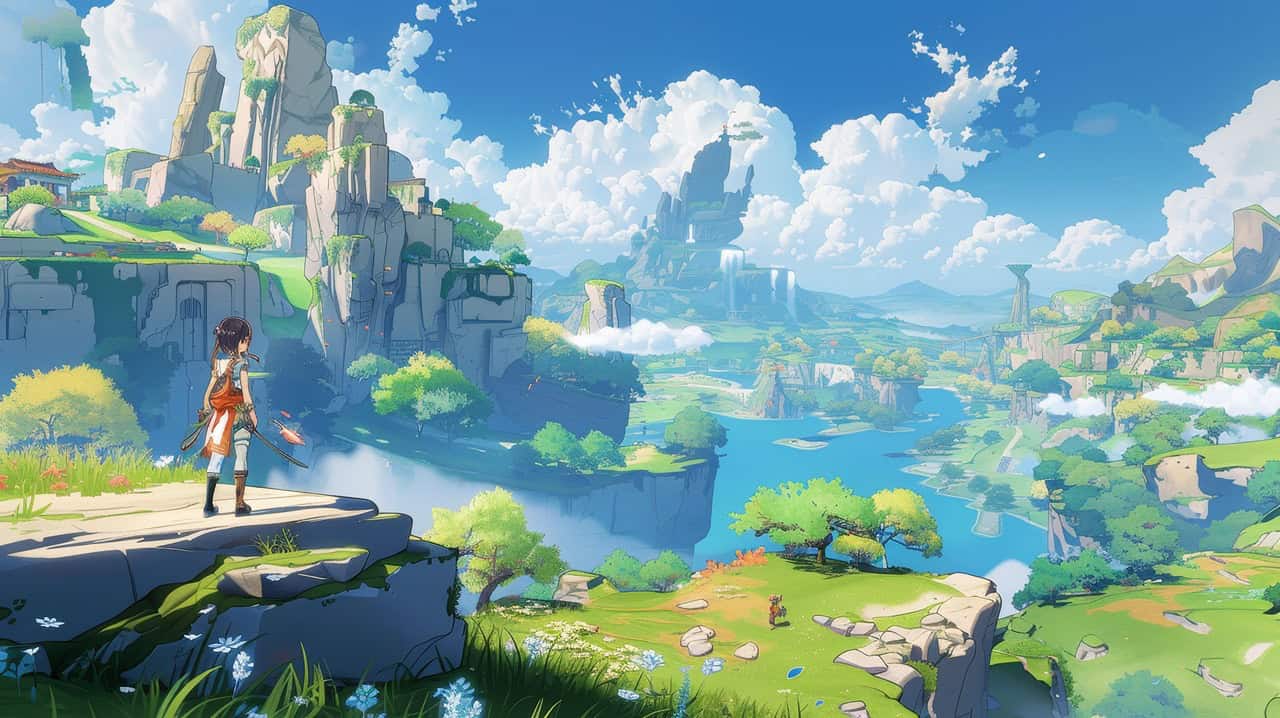
Genshin Impact blends fantasy RPG elements with a vast open world. It offers players a mix of exploration, combat, and character collection in the magical land of Teyvat.
Introduction to Game Genre and Style
Genshin Impact redefines action RPGs with its unique blend of anime aesthetics and open-world exploration. 2 It’s an ARPG that seamlessly merges real-time combat, elemental magic, and character-switching mechanics. While some gamers might be content to play blackjack online for simple entertainment, Genshin Impact offers a far more immersive and complex gaming experience.
The game’s vast, breathtaking world of Teyvat invites players to immerse themselves in a fantasy realm filled with diverse landscapes and intriguing quests. 1
Genshin Impact isn’t just a game; it’s a portal to a living, breathing world of adventure.
MiHoYo’s creation stands out with its gacha system for character acquisition and its free-to-play model. The game’s combat system revolves around elemental reactions, encouraging strategic team compositions and tactical gameplay.
With cross-platform play available, Genshin Impact offers a shared experience across multiple devices, from mobile to console. 1
Key Features of Genshin Impact
Genshin Impact boasts a vast open world called Teyvat, filled with diverse landscapes and hidden secrets. 2 Players explore this fantasy realm using a party of four characters, each wielding unique elemental abilities. 3 The combat system revolves around elemental reactions, creating strategic depth in battles against monsters and bosses.
Character collection forms a core gameplay loop. Players use “wishes” to obtain new characters and weapons through a gacha system. Upgrading artifacts and weapons enhances character strength.
The game supports cross-platform play on PS5, PS4, PC, iOS, and Android. Its free-to-play model, coupled with regular content updates, has led to massive success – grossing $3.8 billion by 2022’s end.
Gameplay Elements of Genshin Impact
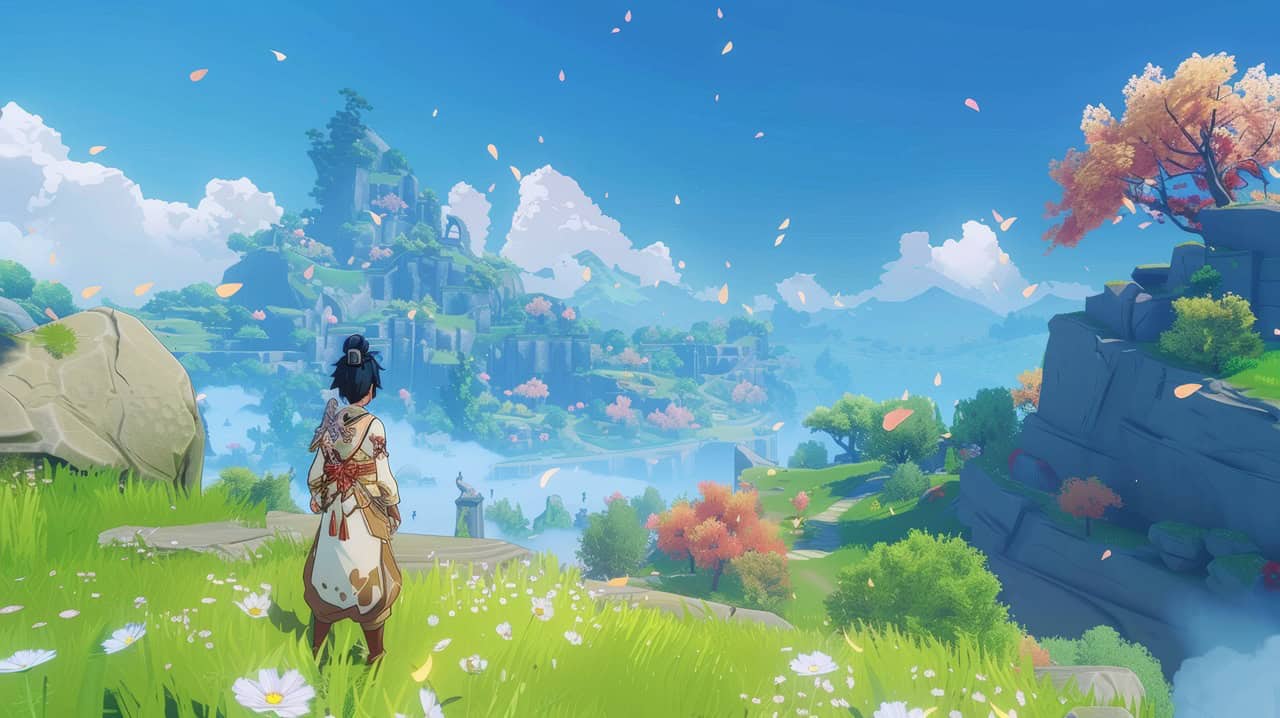
Genshin Impact’s gameplay hooks players with its vibrant open world and deep combat system. You’ll wield elemental powers, swap between characters, and uncover secrets across Teyvat’s diverse landscapes.
Explore the Open World of Teyvat
Teyvat, a vast open world, beckons adventurers with its seven distinct nations. 1 Players freely roam this fantasy realm, scaling mountains, swimming across lakes, and gliding through skies.
The game’s expansive map encourages exploration, rewarding curiosity with hidden treasures and unexpected encounters.
The world of Teyvat is yours to discover.
Genshin Impact’s open-world design mirrors elements from “The Legend of Zelda: Breath of the Wild“. Its diverse landscapes range from lush forests to snow-capped peaks, each area teeming with unique challenges and secrets. 2 Players uncover new story arcs, complete quests, and battle formidable foes as they traverse this richly detailed universe.
Combat Mechanics and Character Skills
Moving from exploration to combat, Genshin Impact’s battle system shines. Players wield five weapon types: Swords, Claymores, Bows, Polearms, and Catalysts. 4 Each character boasts unique Elemental Skills and Bursts, creating dynamic gameplay.
The game’s Elemental System allows players to trigger reactions by combining different elements. This adds strategy to real-time fights. 5
Combat in Genshin Impact features five attack types: Normal, Charged, Plunging, Elemental Skill, and Elemental Burst. These varied options let players craft diverse battle strategies.
The game’s JRPG-inspired mechanics blend seamlessly with action-oriented gameplay, appealing to both casual and hardcore gamers. Boss fights challenge players to master elemental combinations and character synergies.
Upgrade Systems for Artifacts and Weapons
Genshin Impact’s upgrade systems for artifacts and weapons are crucial for character progression. Artifacts, obtainable from domains, boost stats and can be enhanced to level 20. Weapons level up to 90, requiring ascension materials from domains of forgery.
Players strategically mix-and-match artifacts and weapons to optimize character builds. 6
Some players use Genshin Impact booster services to speed up the leveling process. Domains offer specific rewards: Domains of Forgery yield weapon ascension materials, while other permanent domains provide artifacts and talent materials. 7 Unlocking these domains requires reaching Adventure Rank 16, adding depth to the game’s progression system.
Multiplayer Features in Genshin Impact
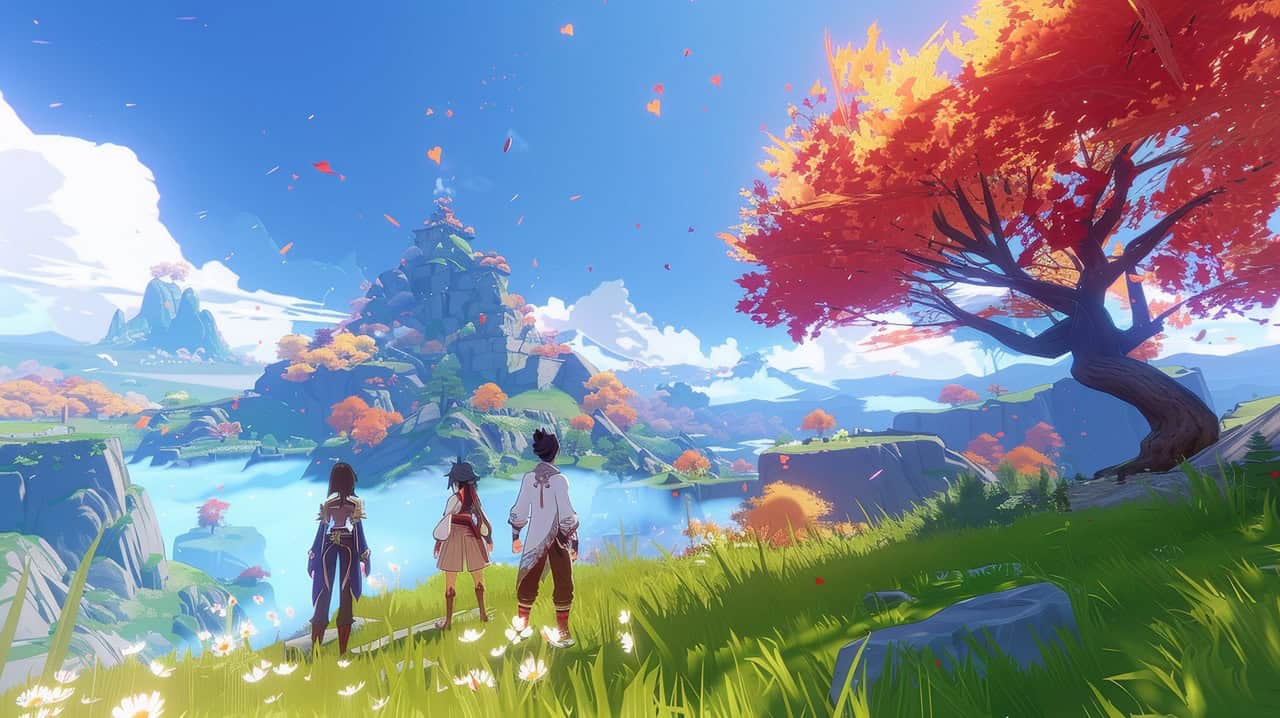
Genshin Impact lets you team up with friends for epic adventures. You can join forces to tackle tough bosses, explore the vast world, and complete challenging domains together.
Cooperative Modes and Multiplayer Gameplay
Genshin Impact’s co-op mode unlocks at Adventure Rank 16, allowing up to four players to team up. Gamers can join friends’ worlds, tackle challenging quests, and explore dungeons together. 8 The ‘gaming meta‘ often revolves around optimal team compositions for tackling tough enemies.
In-game chat and voice communication facilitate seamless coordination during multiplayer sessions. Players strategize to combine elemental abilities, maximizing damage output against bosses.
This cooperative gameplay adds depth to the open-world experience, fostering a sense of community among Genshin Impact enthusiasts. 9
Teamwork makes the dream work in Teyvat!
Community Events and Player Interaction
Community events in Genshin Impact create a vibrant, collaborative atmosphere. Players join forces for unique challenges, tackling special boss fights and quests for exclusive rewards. 8 These time-limited activities foster a strong sense of camaraderie, encouraging teamwork and strategy-sharing among participants.
In-game interactions extend beyond events, with co-op modes allowing up to four players to explore Teyvat together. 8 Friends can team up to conquer difficult domains, defeat powerful world bosses, or simply roam the stunning open world.
This multiplayer aspect adds depth to the gameplay experience, making Genshin Impact more than just a solo adventure. The game’s monetization system plays a crucial role in its ongoing development and player retention. 6
How Genshin Impact is Monetized
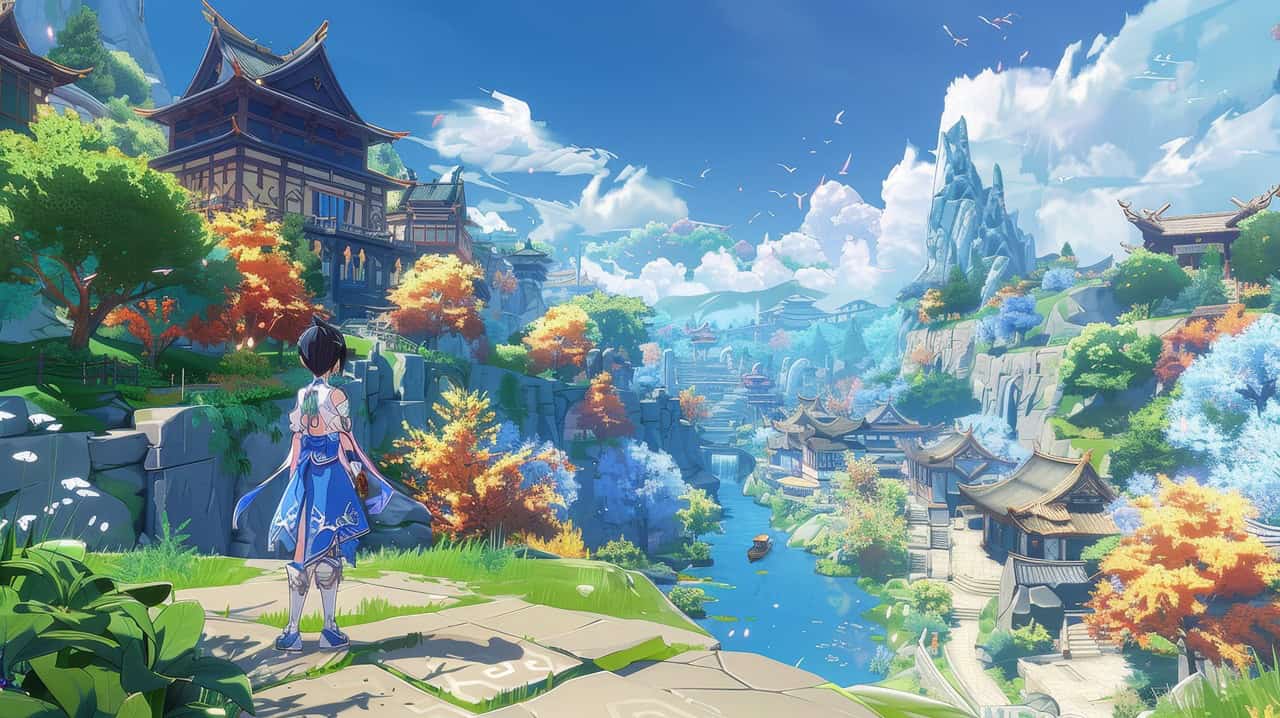
Genshin Impact’s free-to-play model relies on a gacha system for revenue. Players spend real money on “wishes” to unlock new characters and weapons, while a Battle Pass offers extra rewards for dedicated players.
Understanding the Gacha System
Genshin Impact’s gacha system, a core monetization feature, offers players a chance to obtain rare characters and weapons. The system’s low drop rates – less than 1% for five-star characters – create excitement and drive in-game purchases. 10 Character Banners boost specific character drop rates, enticing players to spend more. This mechanic, while controversial, proves essential for free-to-play games’ financial success.
Genshin Impact exemplifies this, generating nearly $400 million in just two months after its 2020 release. 6
Benefits of the Battle Pass
The Battle Pass in Genshin Impact offers a treasure trove of rewards. Players unlock two tiers at Adventure Rank 20: the free Sojourner’s and the $10 Gnostic Hymn. 11 Completing missions throughout the season levels up your pass, granting materials, primogems, and even new female characters.
The paid version amplifies benefits, providing more resources to boost your team’s strength.
Gnostic Hymn holders gain access to exclusive weapons and extra Fragile Resin. This boosts progression, allowing faster artifact farming and character ascension. 12 The Battle Pass system encourages daily play, rewarding consistent engagement with valuable in-game items.
It’s a cost-effective way to enhance your Teyvat adventure, especially for free-to-play gamers seeking an edge.
Platforms Supporting Genshin Impact
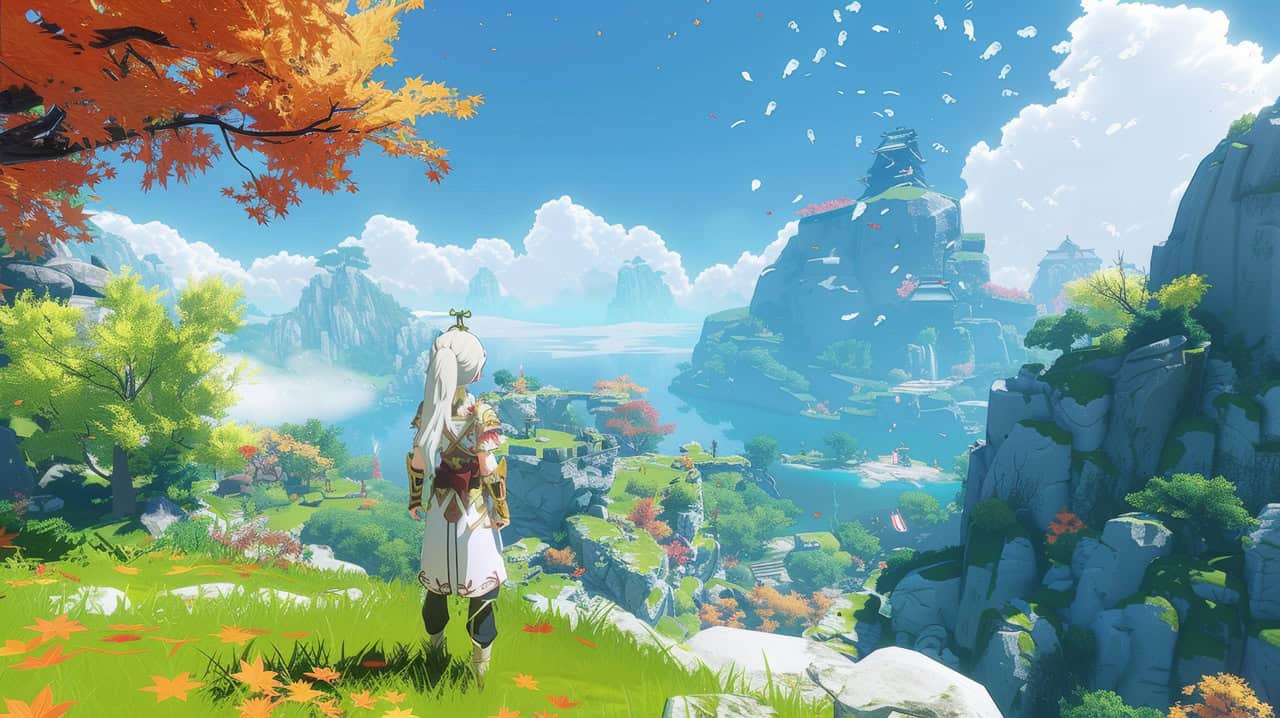
Genshin Impact’s cross-platform support lets you play on multiple devices. You can start on your phone and continue on PC or console without missing a beat.
Compatible Devices and Systems for Gameplay
Genshin Impact runs smoothly on multiple platforms. PS4, iOS, Android, and Windows PC users can dive into Teyvat’s open world. 13 Cross-platform play lets friends team up across devices.
Mobile gamers enjoy on-the-go adventures, while console and PC players experience enhanced graphics.
Pre-downloading ensures a seamless start. 14 A Nintendo Switch version is in development, expanding accessibility. The game’s versatility across systems contributes to its widespread popularity.
Let’s explore the community events and player interactions that make Genshin Impact a social gaming phenomenon.
Games Similar to Genshin Impact
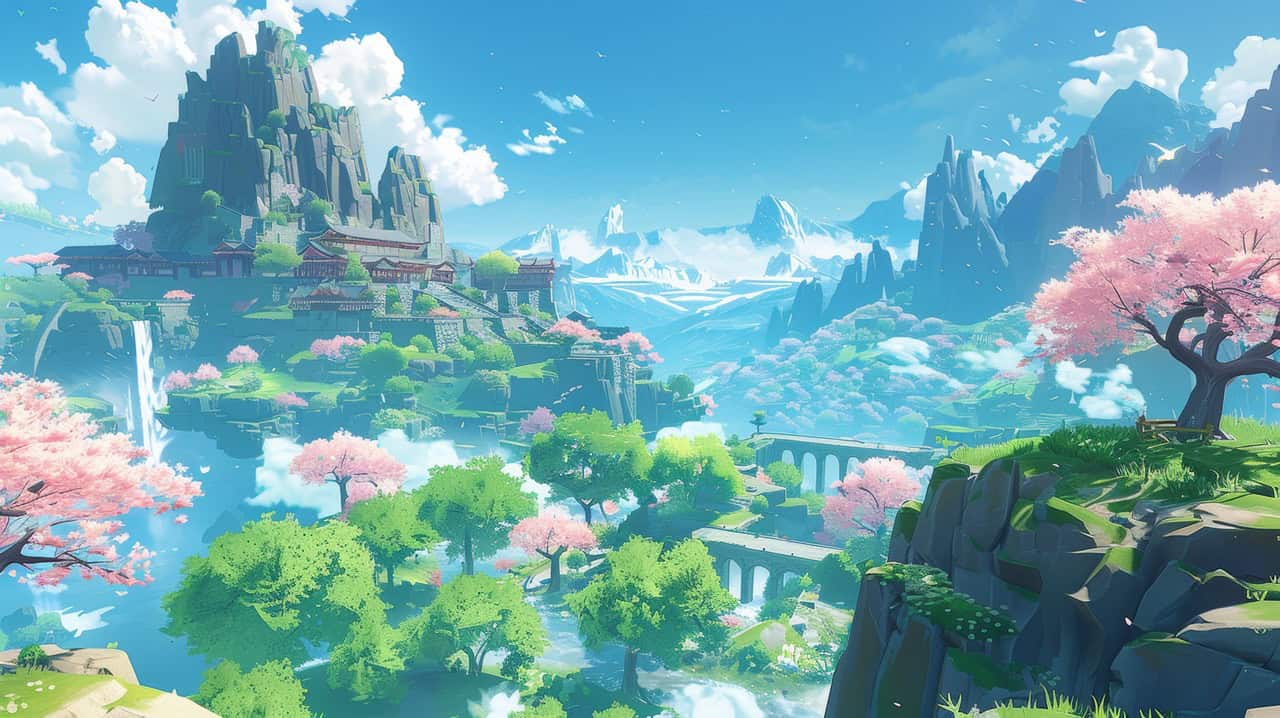
Looking for games like Genshin Impact? Check out these RPGs with similar vibes. From open worlds to character-driven stories, these games offer fresh adventures for fantasy fans.
Recommendations for Similar RPG Games
RPG enthusiasts seeking games like Genshin Impact should check out The Legend of Zelda: Breath of the Wild. Released on March 3, 2017, by Nintendo EPD, it offers a vast open world with similar exploration mechanics. 16 Final Fantasy XV and The Witcher 3: Wild Hunt provide expansive narratives and deep character progression systems. For fans of action-packed combat, Kingdom Hearts III delivers fast-paced battles and intricate storylines. 15 These titles share Genshin Impact’s focus on rich world-building, character development, and engaging gameplay loops. Let’s explore how Genshin Impact compares to other popular RPGs in the market.
Comparative Overview with Other RPGs
Moving from similar game recommendations, let’s compare Genshin Impact to other RPGs. Genshin Impact stands out with its vast open world and elemental combat system. Unlike Honkai: Star Rail’s turn-based battles, Genshin offers real-time action.
It surpasses Tower of Fantasy in character depth and world-building. While Immortals Fenyx Rising shares a vibrant aesthetic, Genshin’s gacha mechanics and frequent updates create a more engaging long-term experience.
Dragon Quest 11 offers traditional JRPG elements, but Genshin’s cross-platform play and co-op features give it a modern edge. 17
Genshin Impact blends elements from various RPGs into a unique package. Its anime-inspired visuals rival those of Tales games. The exploration feels reminiscent of Breath of the Wild, yet with distinct Chinese influences.
Genshin’s character-switching combat adds strategic depth not found in most action RPGs. The game’s live-service model, with regular content drops, sets it apart from single-release titles like Final Fantasy. 16
People Also Ask
What is Genshin Impact?
Genshin Impact is a free-to-play, open-world action role-playing game. HoYoverse developed it. It’s available on PlayStation 4, Xbox, and mobile devices.
How does Genshin Impact compare to other RPGs?
It blends elements from JRPGs, MMORPGs, and games like The Legend of Zelda: Tears of the Kingdom. The game features stunning character designs, a vast world like Hyrule, and gacha mechanics.
Is Genshin Impact pay-to-win?
While free-to-play, it has in-app purchases and loot boxes. Players can progress without spending, but buying can speed up character acquisition. The game balances free and paid content well.
What’s unique about Genshin Impact’s world?
The game boasts a massive, explorable world. Areas like Mondstadt offer diverse landscapes. It’s filled with quests, secrets, and challenges – similar to console gaming experiences.
How often does Genshin Impact update?
As a games-as-a-service title, it receives regular updates. New characters, like Raiden Shogun, are added. Downloadable content expands the story and world frequently.
Is Genshin Impact suitable for all ages?
The ESRB rates it for teens. It’s less grindy than traditional MMOs or Star Ocean. The game balances accessibility with depth, appealing to casual and hardcore players alike.
References
- ^ https://en.wikipedia.org/wiki/Genshin_Impact
- ^ https://genshin.hoyoverse.com/m/en/game
- ^ https://www.gameinformer.com/review/genshin-impact/genshin-impact-review-into-the-great-wide-open (2020-09-28)
- ^ https://game8.co/games/Genshin-Impact/archives/296718 (2021-09-24)
- ^ https://genshin-impact.fandom.com/wiki/Combat
- ^ https://www.diva-portal.org/smash/get/diva2:1669147/FULLTEXT01.pdf
- ^ https://genshin-impact.fandom.com/wiki/Domain
- ^ https://genshin-impact.fandom.com/wiki/Co-Op_Mode
- ^ https://www.thegamer.com/genshin-impact-coop-mode-activities/
- ^ https://medium.com/super-jump/genshin-impacts-gacha-system-is-sneaky-and-misleading-146a339ed345
- ^ https://genshin-impact.fandom.com/wiki/Battle_Pass
- ^ https://medium.com/udonis/love-it-or-hate-it-controversy-over-genshin-impact-monetization-bb1b29c8a899
- ^ https://genshin.hoyoverse.com/en/news/detail/103699
- ^ https://game8.co/games/Genshin-Impact/archives/301609 (2024-05-27)
- ^ https://www.saplingcorp.com/journals/69/games-like-genshin-impact
- ^ https://gamerant.com/games-like-genshin-impact/
- ^ https://www.youtube.com/watch?v=nDsX_0GkxhU
